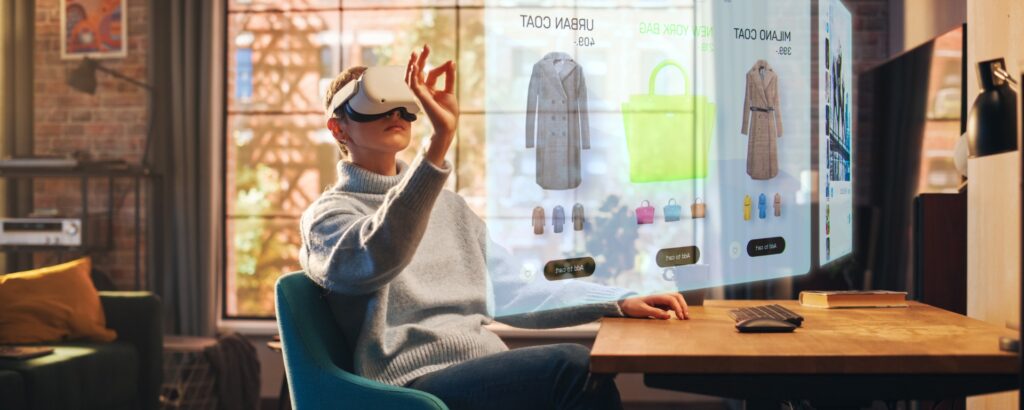The future potential of the metaverse universe for online retail
Share this article
Tags
Categories

Watching your favorite team play from the sidelines, shopping trips to Christmas in New York or Milan, live concerts in London's Hyde Park or a visit to the Pyramid of Cheops in Egypt - it may soon no longer be necessary to get on a plane and travel for all of this, because the concept of the new metaver is creating completely new forms of virtual 3D interaction. The future potential of the metaverse is also gradually being recognized by the big players in the industry - Facebook (now Meta), for example, is making a head start with an investment of ten billion dollars, while Bloomberg forecasts the potential market volume of the metaverse at 800 billion dollars for 2024. Find out what makes the metaverse so exciting for e-commerce, how it has a lasting impact on the virtual shopping experience in online retail and what you need to pay particular attention to here in the fynax blog.
Metaverse - more than just a trend?
First things first: The metaverse serves as access to a virtual online world in which virtual avatars created by users act as protagonists. What initially sounds like a video game is likely to soon establish itself as an integral part of the e-commerce industry, as the aim of big players such as Meta, Amazon and Microsoft is to create a digital parallel world in which avatars and users can use newly emerging three-dimensional marketplaces.
The renaming of Facebook to Meta, the subsequent investment of 10 billion dollars, the market volume forecast at 800 billion dollars and the integration of the gaming platform "Roblox" into the Metaverse are already clear signs for investors and online retailers to take the trend seriously and not underestimate the future potential for online retail.
Application-based technology - the be-all and end-all
The metaver's rapid adaptability, almost infinite design possibilities and the already planned introduction of immersive technologies such as augmented (AR) and virtual reality (VR) will help to permanently change the online shopping experience for consumers.
The first examples of these technologies have already been successfully tested by Amazon and major eyewear manufacturers, for example: With the help of augmented reality tools, buyers can try on glasses virtually or project virtual 3D furniture into their own home on their smartphone using Amazon's Room Decorator.
The success of the concept can also be observed in the gaming world, where consumers are also willing to spend real money on virtual possessions such as tokens, status symbols, properties or items of clothing in order to customize their avatar accordingly. But what exactly does this development mean for online retail? And how can online retailers successfully participate in the metaverse with their store and products?
Opportunities for companies in the metaverse
There are many ways to participate in your online business. As already mentioned, for example, you can offer digital clothing or accessories for the metaverse avatars. However, this does not exclude the sale of real physical products, as the metaverse can also serve as a virtual 3D showroom for your clothing products to offer your customers a better online shopping experience.
Hybrid offers, i.e. virtual and real products, can also be offered on your platform. Gemstone provider Juwelo, for example, sells physical pieces of jewelry together with a non-fungible token (NFT), i.e. a digital certificate of ownership of the product, which is then digitally loaded into the customer's wallet.
In general, the sale of NFTs in the digital art sector is promising, but the sale of digital properties or the advertising made possible simply by the presence of your brand or your products in virtual marketplaces in the metaverse can also improve the reach and profitability of your online store.
New marketplaces are emerging in the metaverse and with them new opportunities for new players in the online industry. In particular, the successful integration of NFTs, which can be used as virtual currency units, as access passes to exclusive online events or as a purchase requirement for selected exclusive products (virtual or real), will be crucial to the success of your online store. Another crucial point for a successful Metaverse presence is likely to be digital interaction with users, as the accessibility and quality of your customer service on the platform ultimately determines customer satisfaction.
The advantages for e-commerce companies
We have listed the most important advantages of joining the Metaverse here:
- Entertainment
- The entertainment factor of your online store and its impact on your customers' willingness to buy should not be underestimated. Virtual experiences in combination with the Gamification-The new approach has a positive impact on consumers' purchasing behavior. Shoe giant Nike, for example, has launched NIKELAND, a 3D area on the Roblox gaming platform in the Metaverse that allows avatars to collect points in a playful way and exchange them for digital clothing.
- First mover advantage
- An early start allows your company to play a pioneering role. Marketing campaigns and advertising placements on an alternative platform with future potential such as Metaverse extend the reach of your products.
- Improved customer service
- Interaction in the virtual space influences consumers' perception of brands and products. In addition, active customer care in the virtual space can improve the product and service experience and thus also have a strong influence on customers' purchasing decisions.
- Market research
- The Metaverse is data-driven. A meaningful Data storage and evaluation can provide valuable information on consumer behavior and thus help the company grow.
- Personalization
- Personalized (marketing) campaigns based on data analysis increase product attractiveness and increase the chances of a positive buying experience.
- Unlimited potential
- The potential for e-commerce is unlimited. Depending on how it develops, the platform can offer new sales opportunities and business models for online retailers.
Of course, the Metaverse is still a beta project at best and has not yet reached the masses. Application-oriented technologies such as AR and VR need to be provided and implemented to a high standard and made accessible to the masses in order to be convincing.
Nevertheless, several factors in the industry now point to a sustained upward trend. High levels of investment by the big players, as well as a number of new virtual reality projects, such as the 3D-based virtual tour of the Pyramid of Cheops using AR technology, illustrate this trend.
For online retailers, early investment in the already important cyber security infrastructure is particularly important. After all, counterfeits, hacked avatars and cyber attacks are also considered the biggest risk factors for your online store in the metaverse.




